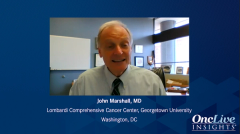
First-line Treatment Approaches and Considerations for Patients With Metastatic ESCC
Focusing on metastatic ESCC, John Marshall, MD, discusses selecting appropriate first-line treatment strategies for patients.
Episodes in this series
Transcript:
John Marshall, MD: For patients who have unresectable disease or metastatic disease, which is a high proportion of the patients that we encounter, we have 2 issues. One, we have the plumbing issue of getting the patients eating and swallowing again and maintaining nutrition. If we need supplementation through PEG [percutaneous endoscopic gastrostomy] tubes or TPN [total parenteral nutrition], we do that as needed. Sometimes we place stents. Sometimes we give chemoradiation, even though there’s metastatic disease, in order to control that local disease. In general, first-line treatments of choice are going to be systemic treatments.
As we are doing in so many worlds today, the base is chemotherapy. You can use platinum-taxane, you can use fluoropyrimidine-platinum. There are 3 drug recipes. They’re more toxic, they have a higher response rate, and they don’t have an overall outcome benefit. Using 2 drugs tends to be the basic right choice for most patients in the front line. Then we look for the options for biologics. We test everybody for PD-L1 using CPS [combined positive score] scoring, and in those patients with high numbers, there’s pretty good evidence that adding anti–PD-1 therapy to chemotherapy will benefit those patients. They’re rare patients who are HER2 [human epidermal growth factor receptor 2]–positive and have both HER2 and PD-1 as potential options added to the chemotherapy.
Increasingly, first-line therapy for squamous cell cancers of the esophagus is doublet chemotherapy with checkpoint inhibition, so it’s a 3-drug cocktail in total. These are the best reported outcomes so far in these patient populations. Of course, with any patient, there may be some who aren’t candidates for immunotherapy-type approaches. These are patients who have preexisting autoimmune problems that are going to increase their risk from immunotherapies. But increasingly, there aren’t that many people who wouldn’t be candidates for immunotherapies.
Transcript edited for clarity.





































